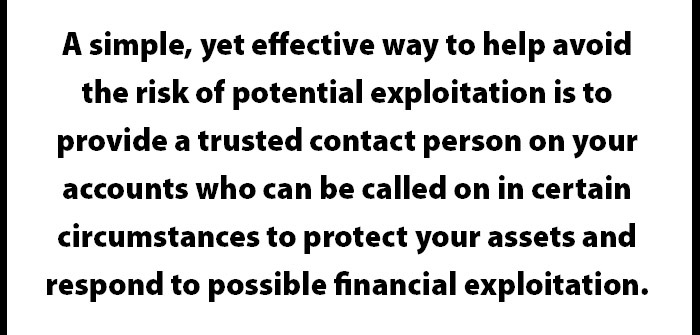Financial exploitation is a growing problem for American retirees and their families. It’s important to be familiar with common scams — such as being contacted about an unexpected windfall or an investment opportunity that sounds too good to be true. But more than knowing the warning signs of exploitation, it’s equally important to be proactive about its prevention.
A simple, yet effective way to help avoid the risk of potential exploitation is to provide a trusted contact person on your accounts who can be called on in certain circumstances to protect your assets and respond to possible financial exploitation. This trusted contact person might be a family member or a friend. Or it might be a professional you depend upon, like an attorney or accountant.
A trusted contact person is someone you authorize your financial advisor to contact only if they are unable to reach you directly. This person is not an authorized party on your account(s), and your financial advisor will not accept instructions from them to effect transactions and/or change account information.
Hypothetical Example
Let’s say you and a spouse have a joint account with check-writing capability, and you are on a cruise together. Let’s also say your financial advisor notices a large transaction on your account that is not typical for you. The advisor is unable to reach you to verify the authenticity of the transaction and is concerned this is fraud.
The good news is: You provided a close sibling as your trusted contact person. Your advisor follows up with them and is able to locate you to verify if the charge is valid.
FINRA, the securities industry self-regulatory organization, has actually turned the practice of naming a trusted contact into a rule, and requires that your financial advisor ask you if you would like to name a trusted contact person at the time you open or make material changes to your account(s). It’s a good idea, is easy to do, and could help you avoid financial exploitation in the future.
This article is provided by RBC Wealth Management on behalf of Pamela J. Carty, AWM, a financial advisor at RBC Wealth Management, and may not be exclusive to this publication. The information included in this article is not intended to be used as the primary basis for making investment decisions. RBC Wealth Management does not endorse this organization or publication. Consult your investment professional for additional information and guidance.
RBC Wealth Management, a division of RBC Capital Markets, LLC, Member NYSE/FINRA/SIPC





